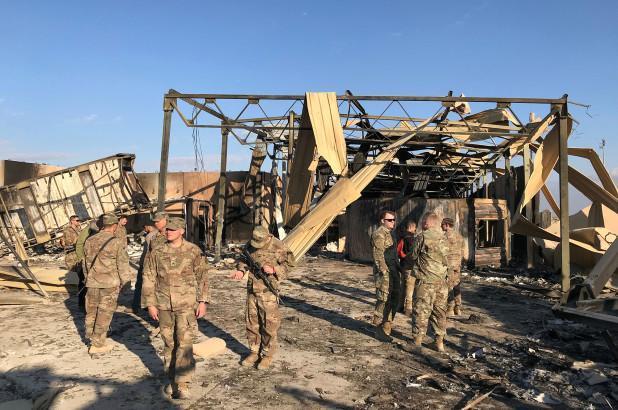
U.S. soldiers inspect the site where an Iranian missile hit at Ain al-Asad air base in Anbar province, Iraq, Jan. 13, 2020. (Reuters File Photo)
The United States treated 11 of its troops for symptoms of concussion after an Iranian missile attack on an Iraqi base where U.S. forces were stationed, the U.S. military said on Jan. 16, after initially saying no service members were hurt.
The attack was retaliation for a U.S. drone strike in Baghdad on Jan. 3 that killed Qassem Soleimani, the commander of the elite Quds Force of Iran's Revolutionary Guard.
President Donald Trump and the U.S. military had said there were no casualties after the strike on the Ain al-Asad air base in western Iraq and a facility in its northern Kurdish region.
"While no U.S. service members were killed in the Jan. 8 Iranian attack on Al Asad air base, several were treated for concussion symptoms from the blast and are still being assessed," Captain Bill Urban, spokesman for U.S. Central Command, said in a statement.
As a measure of caution, some service members were taken to U.S. facilities in Germany or Kuwait for "follow-on screening," he added.
"When deemed fit for duty, the service members are expected to return to Iraq."
As many as 1,500 Americans were deployed at the vast base deep in Iraq's Anbar desert.
The U.S. Treasury Department said on Jan. 16 it will allow for a 90-day period to wind down transactions in certain sectors of Iran's economy hit with fresh U.S. sanctions last week.
The period, good through April 9, allows transactions in the construction, mining, manufacturing or textiles sectors of Iran's economy that could be targeted under last week's action to be wound down without exposure to sanctions, the Treasury Department said in an update to its frequently asked questions, or FAQs, on Iran sanctions on its website.
Entering into new business that falls under the sanctions imposed on Jan. 10, however, would not be considered winding down and could still be sanctionable, the FAQ said.
The United States imposed more sanctions on Iran on Jan. 10 in retaliation for its missile attack on U.S. forces in Iraq last week and vowed to tighten the economic screws if Tehran continued "terrorist" acts or pursued a nuclear bomb.
Tensions between Washington and Tehran have spiked since Trump unilaterally withdrew in 2018 from the Iran nuclear deal struck by his predecessor, Barack Obama, and began reimposing sanctions that had been eased under the accord.
The targets of the sanctions included Iran's manufacturing, mining and textile sectors as well as senior Iranian officials who Washington said were involved in the Jan. 8 attack on military bases housing U.S. troops.
During that period of high alert, Iran shot down a civilian airliner in what it now says was a tragic mistake. This has triggered anti-government protests at home.
Countries demand compensation from Iran
Five countries whose citizens died when Iran shot down an airliner last week said on Jan. 16 that Tehran should pay compensation to families of the victims, and warned that the world is watching for its response.
Canada, Ukraine, Sweden, Afghanistan and Britain said Iran should hold a "thorough, independent and transparent international investigation open to grieving nations," in a statement issued after a meeting of officials in London.
The airliner was struck by a missile on Jan. 8 shortly after it left Tehran en route to Kiev. Iran admitted on Jan. 11 it had shot down the Ukraine International Airlines plane in error, after initially denying it had a role in the incident. All 176 people aboard, including 57 Canadians, were killed.
The five countries asked Iran to conduct the process of identifying victims with dignity and transparency while respecting the wishes of families regarding repatriation.
"The eyes of the international community are on Iran today. I think that Iran has a choice, and the world is watching," Canadian foreign minister Francois-Philippe Champagne said at a news conference in London.
The countries said they welcomed Iran's engagement to date.
Earlier on Jan. 16, the foreign ministers of the five countries each lit a candle to commemorate the victims at the Canadian High Commission in London, and paused for a moment of reflection.
Most of those on Ukraine International Airlines flight 752 were Iranians or dual citizens, many of them students returning to studies abroad or families on their way home after visiting relatives in Iran.
The premier of Ontario, Canada's most populous province, proposed a fund on Jan. 16 to disburse 57 scholarships of C$10,000 ($7,663.42) each, in honour of the number of Canadians killed in the crash.
Many of the victims were academics, researchers and students linked to 19 Canadian universities.
Ukrainian Foreign Minister Vadym Prystaiko said on Jan. 16 that he had discussed with his Iranian counterpart Mohammad Javad Zarif the repatriation of the bodies of Ukrainian victims.
The bodies of all 11 Ukrainians who were killed have been identified and will be transported back to Ukraine on Jan. 19, the interior ministry said in a statement to Reuters.